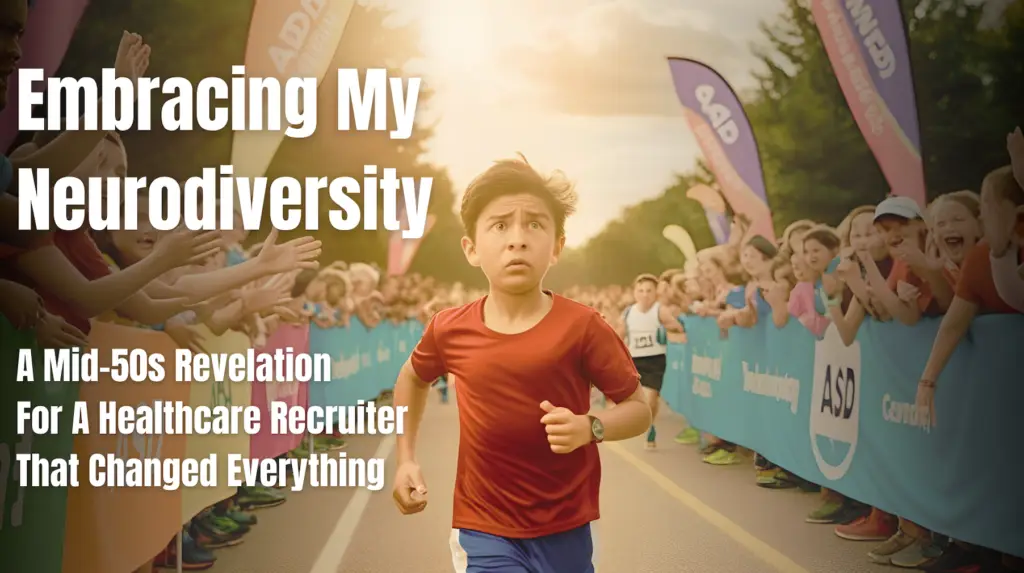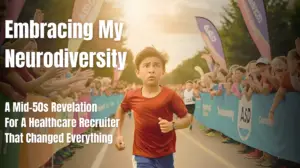A Mid-50s Revelation For A Healthcare Recruiter That Changed Everything
Last year, as I passed my mid-50s, I received two life-altering diagnoses: ADHD and Autism Spectrum Disorder (ASD). For decades, I’d navigated a successful career in aged care and hospital recruitment, built a family with my incredibly patient wife, lived in The UK, France, NZ and Australia, and tackled life’s challenges, all whilst feeling like something about me didn’t quite fit.
I couldn’t explain why certain moments left me reeling or why I made choices that baffled even myself. But these diagnoses? They’ve been a gift. They’ve answered questions I didn’t even know how to ask and empowered me to embrace who I am—neurodiversity and all.
Looking back the signs were always there. When I was five, at my school sports day. I was fast, and I was about to cross the finish line first and grab the glory. But just before the end, I slowed down. I let someone else take the win. Why? because the thought of every eye in the crowd turning to me, clapping and cheering, felt unbearable. Even at that age, the spotlight was my kryptonite. I didn’t have the words then, but now I know: that was my autism speaking, my deep discomfort with social attention.
Fast forward to my career. I’ve spent over 25 years in recruitment, connecting talented people with roles that matter in aged care and healthcare. I love my work, solving problems, building relationships, making a difference. But some moments didn’t add up. Like the time I attended a recruitment awards gala. As one of the top-performing recruiters in the company, I had a 50/50 shot at winning a dream holiday, and instead of excitement, I felt dread. My heart raced, my palms sweated, my legs felt like they wouldn’t be able to carry me up onto the stage, and I prayed my name wouldn’t be called out. The idea of walking up, all eyes on me, triggered a full-blown panic attack. I didn’t win that holiday, and I was relieved. Back then, I thought I was just shy or overly anxious. Now I see it was my neurodiverse brain, wired to avoid overstimulation and social overload.
These diagnoses have been like a lens, bringing my past into focus. Why did I struggle to sit still in meetings unless I was doodling or pacing? ADHD. Why did I agonise over getting a job advert or candidate match just right, only to lose track of time and energy, leaving me drained? My perfectionism and ASD and ADHD working together.
Why do I excel in the chaos of recruitment but crumble under unstructured social settings? Both. For years, I masked these traits, pushing through, adapting, succeeding, but at a cost. A healthy dose of imposter syndrome, never entirely understanding why I operated differently.
Now, I’m done masking. I’m embracing my neurodiversity, and it’s made me more effective personally and professionally. I’ve put strategies in place that play to my strengths and honour my needs. For my inattentive ADHD, I use tools like time-blocking and visual task boards to stay on track and combat distractions. No more drifting off mid-task, I’m deliberate about keeping my attention where it needs to be. For ASD, I’ve learnt to prepare for high-stimulation situations. Before a networking event or big meeting, I script key points, plan breaks, and permit myself to step away if it gets too much. I’ve even started saying “no” to things that drain me, and “yes” to what fuels me: deep, meaningful work like mentoring candidates or solving complex staffing challenges.
This shift hasn’t just made me better at my job; it’s made me kinder to myself. I used to beat myself up for past “failures”, slowing down in that race, panicking at the recruitment awards, or losing hours to a task because I couldn’t switch gears, whilst others multitasked effortlessly.
Now I see those moments as evidence of a brain that’s wired differently, not defectively. My inattentive ADHD gives me creativity and a unique perspective; my ASD gives me precision and a passion for patterns. Together, they’ve helped me build a career I’m proud of, 25 years of placing nurses, allied health staff and healthcare managers in roles that have transformed their lives.
To anyone reading this who’s ever felt like they don’t quite fit: you’re not alone. A late-in-life diagnosis might just be the key to unlocking who you’ve always been. For me, it’s been a liberation. I’m Paul Wheeler, Father, Husband, Recruitment Director, and now, proudly neurodiverse. I’m not slowing down anymore to avoid the spotlight. I’m stepping into it, on my terms, to share what I’ve learnt and help others find their place. Because in healthcare, in recruitment, in life, diversity, in all its forms, is our strength.
You can read this and other articles on my LinkedIn newsletters
#Neurodiversity
#Leadership
#MentalHealth
#Inspiration
#DiversityMatters
#WorkplaceWellness
#Authenticity
#HealthcareHeroes
#NeurodiverseCareers




